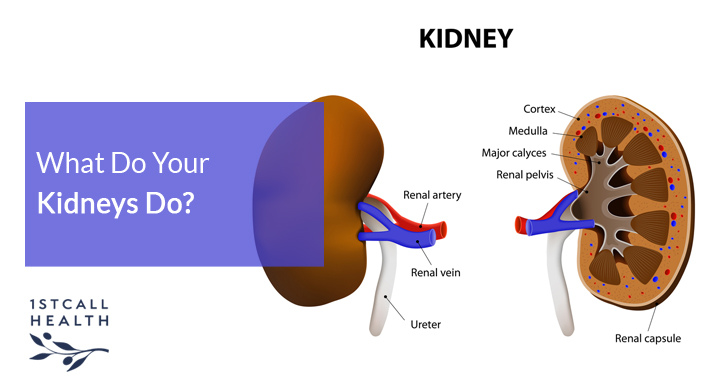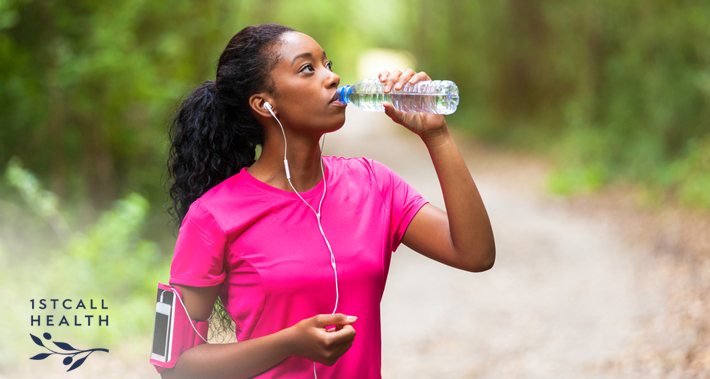
There are a lot of moving parts which work together in order for your body to function properly.
Cells make up tissues, tissues make up organs, and organs make up systems.
And each system has a specific function.
Your musculoskeletal system gives your body structure and allows for movement.
The digestive system breaks down food to extract energy from it.
And the urinary system filters your blood and creates the waste byproduct we know as urine.
Your kidneys are an important part of your urinary system.
We’re a primary care provider in Washington DC and we know preventative care is crucial to keeping you healthy and making sure your kidneys function properly.
Today we’ll learn about the functions of your kidneys, common kidney issues, and what you can do to keep your kidneys healthy.
Let’s take a closer look.
What Are Your Kidneys?
Your kidneys are a pair of organs located in your abdomen, just beneath the ribcage on each side of the spine.
Each kidney is about the size of a fist.
They’re the sixth largest of the organs in your body, after your skin, liver, brain, lungs, and heart.
They are a part of your urinary system.
Kidneys have the same shape and are similar in color to the kidney bean, which got its name because of its similarities to the organ.
What Do Your Kidneys Do?
Your kidneys are important for helping keep your body healthy.
The most important jobs they perform include:
- Cleaning and filtering your blood to remove waste
- Producing red blood cells
- Maintaining the pH balance of your body
- Making vitamin D
- Controlling blood pressure
What Are Some Common Kidney Issues?
There are a variety of health issues which can affect your kidneys.
Let’s review some of the common ones.
1. Kidney Stones
Kidney stones form when minerals build up and crystalize in your kidney, ureter, bladder, or urethra.
This can be made up of a variety of substances, including:
- Calcium oxalate (~80% of kidney stones)
- Calcium phosphate (~15% of kidney stones)
- Uric acid (~8% of kidney stones)
- Cystine (~2% of kidney stones)
- Struvite (~1% of kidney stones)
They can also be made of other substances, but that’s extremely rare (less than 1%).
Although it can be very painful to pass a kidney stone, they rarely result in serious problems.
2. Urinary Tract Infections
Urinary tract infections (UTIs) are bacterial infections affecting the organs in the urinary system.
These include the urethra and bladder (lower urinary tract) and the ureters and kidneys (upper urinary tract).
Infections involving the upper tract are less common and generally more serious than infections involving the lower tract.
Most urinary tract infections are easily treated.
However, if left untreated they can result in serious side effects including kidney failure.
3. Chronic Kidney Disease
Chronic kidney disease is a condition which is usually a result of hypertension (high blood pressure).
In those with high blood pressure, there is excess force placed on the glomeruli.
These are the blood vessels in your kidneys where blood is filtered and cleaned.
Because of this, over time, the glomeruli are damaged and kidney function declines.
Eventually, you’ll need dialysis to remain healthy.
4. Polycystic Kidney Disease
Polycystic kidney disease is characterized by cysts (small fluid filled sacs) which form in the kidneys.
In most cases, polycystic kidney disease is inherited.
It can also develop if you have chronic kidney disease.
Symptoms include:
- Bloody urine
- Frequent and painful urination
- Abdominal tenderness
- Bruising easily
- Fatigue
- Joint pain
- Pale skin
- Back pain
- Other kidney issues such as urinary tract infections and kidney stones
5. Kidney Failure
Kidney failure is a condition where your kidneys aren’t able to function at the level required to keep you alive.
It involves the loss of ability for your kidneys to maintain fluid balance, excrete waste, concentrate urine, and conserve electrolytes.
Symptoms of kidney disease advancing into kidney failure may include:
- Fluid retention which results in swelling
- Low sex drive
- Decreased appetite
- Nausea and vomiting
- Decrease urination
- Fatigue and weakness
- Hypertension
- Low red blood cell count
- Cognitive changes including mood swings, anxiety, and confusion
How Do I Know If I Have Kidney Problems?
In many cases, kidney problems will go undetected until the symptoms become quite severe.
Some early signs to watch out for which can indicate kidney problems include:
- Dry skin
- Tiredness
- Urinating more than usual, especially at night
- Brain fog
- Puffy eyes in the morning
- Low appetite
- Swollen ankles and feet
- Difficulty sleeping
- Muscle cramps
How To Keep Your Kidneys Healthy
Kidney disease can be serious, but fortunately there are some proactive steps you can take to keep your kidneys healthy.
Let’s look at some of the things you can do if kidney health is at the top of your mind.
1. Eat A Kidney Friendly Diet
As with just about anything else, the foods you eat can have a huge impact on your health – and specifically, your kidneys.
Foods you think of as being healthy for your body and heart are also going to help maintain the health of your kidneys.
Some tips for eating include:
- Avoid saturated fats and trans fats
- Keep your cholesterol in check
- Use spices instead of salt to season food
- Reduce how much fried food you eat – tried broiling chicken, fish, and meat instead
- Watch for foods high in processed sugar
- Add more whole grains to your diet
2. Keep Your Stress Under Control
While some amount of stress can be good, if you are under chronic stress it can take its toll on your body.
The physical response to stress can include increased blood pressure, and higher levels of sugar and fat in your bloodstream.
Both of these can impact your kidney health.
Managing stress through things such as physical activity, yoga, and meditation can help keep your kidneys healthy.
3. Keep Your Diabetes Under Control
If you have type 1 or type 2 diabetes, you’re at greater risk of developing kidney disease.
Monitoring your blood sugar levels and keeping them close to your goal can help keep your diabetes in control and prevent kidney damage.

4. Stay Hydrated
Dehydration can increase your risk for kidney stones and other kidney related complications.
Getting plenty of water and other fluids such as herbal teas and carbonated water can help keep your kidneys healthy.
Avoid drinks with added sugar such as pop and juice.
Remember too that caffeine in coffee and tea has a diuretic effect – the water in it is offset by the fact that you’re peeing it out faster.
Book Your Appointment With 1stCallHealth Today
Do you struggle with reoccurring kidney stones?
Or worry that you could be at risk for other kidney related issues?
At 1stCallHealth we want to help you take control of your health, through concierge primary care services.
Book your appointment today and make sure you’re getting the care you need.
1stCallHEALTH
1331 H St NW Ste 200,
Washington, DC 20005
(202) 590-0009
– https://goo.gl/maps/MVhjkz2jqynWpsgo6
1stCallHEALTH provides affordable access to primary care services. We believe that everyone deserves affordable, high quality primary care. Our vision is to challenge the status quo, focus on the individual, and empower personal control to change the way we think about healthcare.




